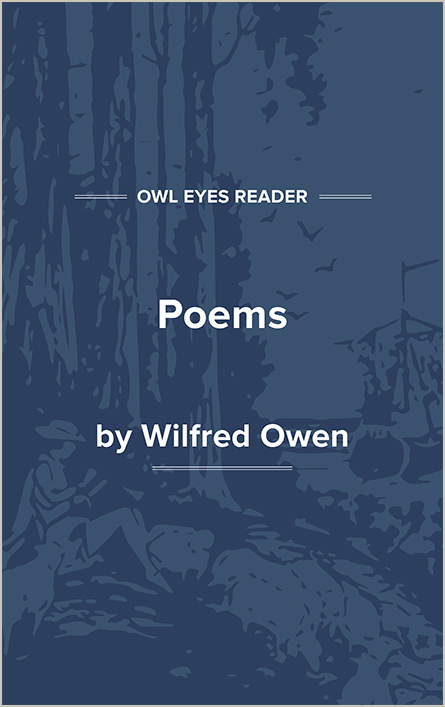Wilfred Owen Biography
Wilfred Owen was born and raised in the Shropshire countryside made famous by another poet, A. E. Housman. After Owen was born in Oswestry, his family moved to Shrewsbury for a year and then to Birkenhead, near Liverpool, where in 1900 he entered school. In 1911 he matriculated at London University. According to his friend Edmund Blunden, whose The Poems of Wilfred Owen (1931) contains an affectionate and detailed account of the poet’s short life, Owen was a quiet, imaginative boy not given to sports, whose greatest pleasure was to be read to by his mother. One of his important early influences came from his family’s Anglican evangelicalism.
Owen, deep in his earliest love, John Keats, was writing verse by the time he reached London University. Serving in the military in World War I, he was awarded the Military Cross on October 1, 1918, and killed in action on November 4. His life and his poems reveal a highly sensitive, idealistic young man given to aestheticism, who was transformed by the horrors of trench warfare into a quietly courageous leader of men, a biting social critic, and a poet of tough truthfulness and humanity. He is generally regarded as the greatest English war-poet.
As a boy Owen read widely, not only Keats but also Charles Dickens, Sir Walter Scott, George Eliot, and John Ruskin, for whose work he had great respect, except “that Prophet . . . warned us so feebly against the war.” He played the piano, studied botany and archaeology, and in August of 1913 became a tutor in English at the Berlitz School, Bordeaux, France. After some private tutoring he returned to England in 1915 and joined the Artists’ Rifles. His friendship in Bordeaux with M. Laurent Tailhade was his first contact with a genuine man of letters, for despite Owen’s love of poetry, he had never been part of a literary circle. Although he initially contemplated music or perhaps painting as a profession, he was aware that poetry was his first love.
Owen was sent to the front in 1916, shortly after Christmas, with the Lancashire Fusiliers. That spring he fell into a shell hole and suffered a concussion that affected his nerves so that, on June 26, 1917, he was sent back to Craiglockhart Hospital, Edinburgh, where he met and became close to the poet Siegfried Sassoon, a...
(The entire page is 584 words.)
Owl Eyes subscribers get unlimited access to our expert annotations, analyses, and study guides on your favorite texts. Master the classics for less than $5/month!

